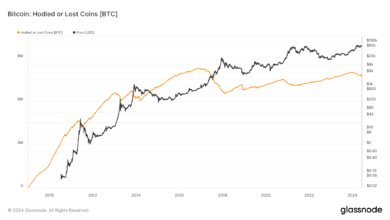
Bitcoin’s 16% plunge to below $50,000 earlier this week has left investors and traders scrambling to make sense of the sudden shift in market dynamics. Many analysts tell Decrypt that the top cryptocurrency’s volatility presents opportunity, and most remain bullish in the long term.
The recent crypto carnage comes amid heightened global economic uncertainty, with factors such as inflation concerns, geopolitical tensions, and shifting monetary policies contributing to market volatility across various asset classes. Bitcoin, often touted as a hedge against traditional market instability, has not been immune to these broader economic forces.
Also a factor, the introduction of Bitcoin Spot ETFs, which have attracted substantial institutional interest. Despite an influx of $17 billion in net inflows to these new investment vehicles, however, the cryptocurrency’s price has failed to maintain the upward momentum many had anticipated.
Rich Rines, a CORE DAO contributor, tells Decrypt that Bitcoin’s price movements are part of its maturation process, and steep fluctuations present buying opportunities for strategic investors.
He points to the growing ecosystem around Bitcoin, including ETFs and yield options, as factors that could enhance market stability and attract a broader investor base over time.
“As more financial products emerge around Bitcoin, they contribute to its legitimacy and appeal to a wider audience,” Rines said. “This combination of strategic accumulation and institutional interest positions Bitcoin favorably for long-term growth, making it an increasingly integral asset for both individual and institutional investors.”
Echoing that perspective, Pedro Lapenta, head of research at Hashdex, said he sees signs of resilience in Bitcoin’s recent price action, which rebounded from Monday’s lows. He said that suggests that the asset has bottomed.
“Given the outlook for institutional adoption and the stage of the crypto cycle we are currently in, we believe every weakness in BTC prices is a ‘buy the dip’ opportunity for those on the sidelines or who want to add risk.”
“While we can anticipate price volatility through the end of the year and beyond, these recent events should not be seen as something that changed the long-term view on BTC,” he added.
However, not all analysts share this optimistic outlook.
Analysis from 10x Research suggests that Bitcoin faces significant hurdles in the short term, with a BTC price of $56,000–$57,000 expected to act as significant resistance. The firm notes that despite the substantial inflows into Bitcoin ETFs, prices have remained relatively stagnant compared to their levels at the time of their launch.
This raises questions about the type and motivations of sellers in the market, which could range from early investors taking profits to hedge funds unwinding arbitrage.
“To ideally time the next bull market entry, we aim for Bitcoin prices to fall into the low 40,000s,” 10x Research states.
Michael Terpin, founder of Transform Ventures and author of Bitcoin Supercycle, said that regardless of the next 60 days, the bull market will continue along traditional four-year cycle lines with solid gains in October and November.
“If Trump wins, a rush of new buyers could take the Bitcoin price over $100,000,” according to Terpin.
He added that historically, the six months after the halving have had pullbacks, and this fifth Bitcoin cycle is no exception.
“It’s unlikely that the price will rise much while institutional investors are in the south of France or the Hamptons, but October and November are historically strong months for bitcoin, especially in the year of the halving and the year after,” Terpin said.
Edited by Ryan Ozawa.
Daily Debrief Newsletter
Start every day with the top news stories right now, plus original features, a podcast, videos and more.
Source link





